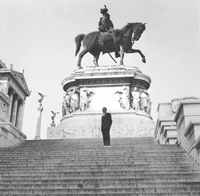Manufacturing memoirs as a means to ambiguous ends
As it becomes increasing difficult to distinguish fact from fiction, the new Walid Raad/Atlas Group exhibition questions the construction of history, ethics, and ambiguity with its timely theme. In a matter of fact presentation, selections from the donated cultural archive include different forms of documentation including video. An explanatory text states that the material presented is part of the Atlas Group Archives, a foundation that collects and exhibits visual material pertaining to the civil war in Lebanon between 1975 and 1991. The Lebanese artist, Walid Raad will present two lectures at the Kitchen during the course of the exhibition.
A series of black and white photos of the founder are taken in front of European monuments, the one time he left Lebanon. Another framed group shows varying makes and models of cars surrounded by Arabic notation that describes the time, place, and number of people killed by the vehicles used in suicide bombings.
Notebook pages with complex notations about horse racing, gambling, and the people involved are difficult to decipher. Mediterranean drowning victims, tiny and faded, sit below large azure rectangles. Text declares the images were discovered by scientists when analyzing war debris; all drowned during the war period.
Three videos continue the surprise of the presented selection with their elaborate and obtuse explanations. The first, a 52-second video montage, is a barrage of signs in Arabic for doctors and dentists. A poetic take on surveillance shows a series of sunsets captured by a wayward security guard who disobeyed orders turning the camera from his intended surveillance domain to the horizon.
Questioning objective truth, “Hostage: The Bachar Tapes (# 17 AND # 31) English Version,” 1993-2002, provides a sixth perspective on the kidnapping of six men held in a small room together for three months. The sole Lebanese victim states in the video that there were sexual encounters and his body was viewed with suspicion. The published accounts from the five America’s held vary widely in their remembrance on their shared experience.
Taken at face value, one questions the eccentric choices presented. There is no clear indication that the exhibition is other than true, and questions arise about the ethics of factual presentation. With its pertinent, apt theme, the cracks begin to show with further inquiry. The press materials reveal that Raad is the founding and only member of the Atlas Group and he considers the material presented “Hysterical Documents,” a mixture of the real and constructed. History is tied to memory and recollection; this exhibition questions the history of construction and the construction of history.
gaycitynews.com


































